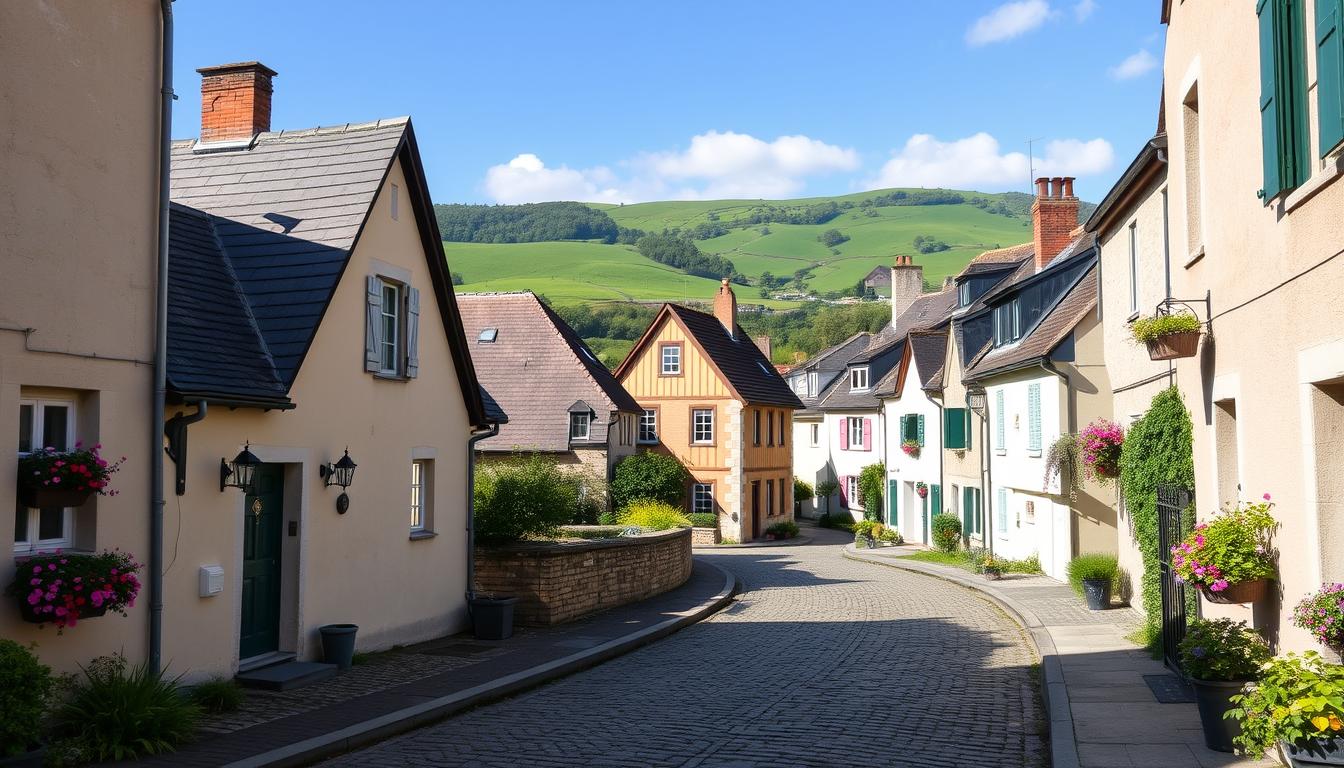Over 770 million people worldwide, which is around 10% of our global population, are 65 or older. By 2050, that share is set to reach 16%. So, many of us are looking for a new place to settle in our golden years abroad.
This European retirement guide shows why we choose to retire in Europe. It’s because of the cultural richness and modern healthcare. We get peace of mind here. We use resources like the 34th Annual Global Retirement Index to guide us. It ranks places by cost of living, healthcare, and quality of life.
We’ll explore residency options like Golden Visas and non-lucrative permits. This will help you make the transition smoothly.
Why Choose Europe for Retirement?
Europe is special because it mixes grandeur with friendliness. It has Gothic cathedrals and lively folk traditions. This mix makes retirement here rich and engaging.
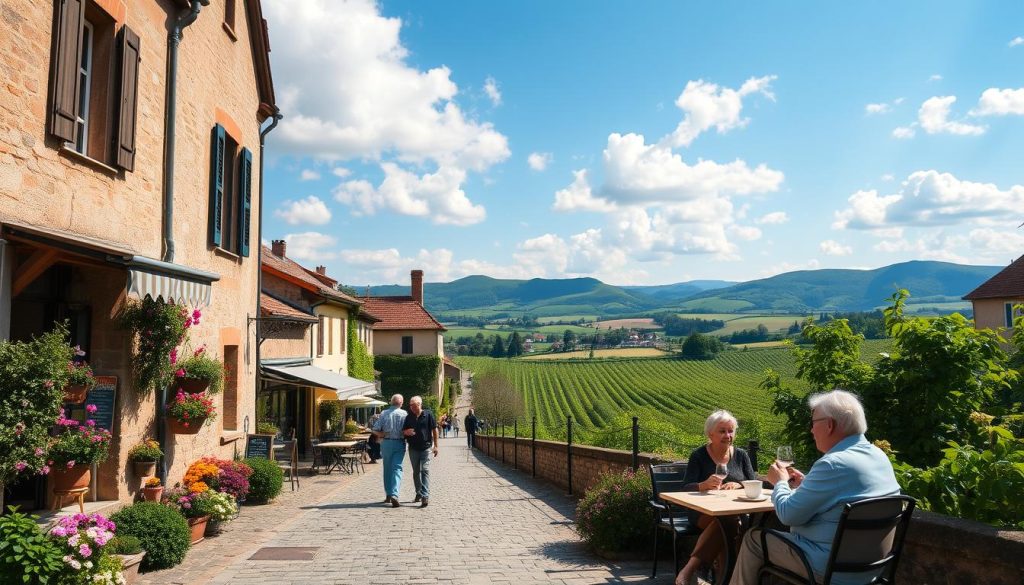
Rich Culture and History
Europe is full of history, seen in art galleries and old streets. These places show centuries of creativity. Living here, we enjoy festivals and art, making our retirement fulfilling.
Access to Quality Healthcare
Good health is key in retirement. Europe’s healthcare is designed to support us well. Countries like Malta and Sweden have top-notch medical care. This gives us peace of mind every day.
Strong Community of Expats
Building new friendships is exciting. Europe has many groups for expats. These offer support and help us feel at home, making the move easier.
Top European Countries for Retirement
Europe offers a wide range of choices for retirees. Some places are more expensive, while others are more affordable. The Netherlands and Finland are among the top, with great quality of life.
Many retirees look for a balance between cost and comfort. Portugal, Spain, and Italy are our top picks. Each country has its own unique benefits.
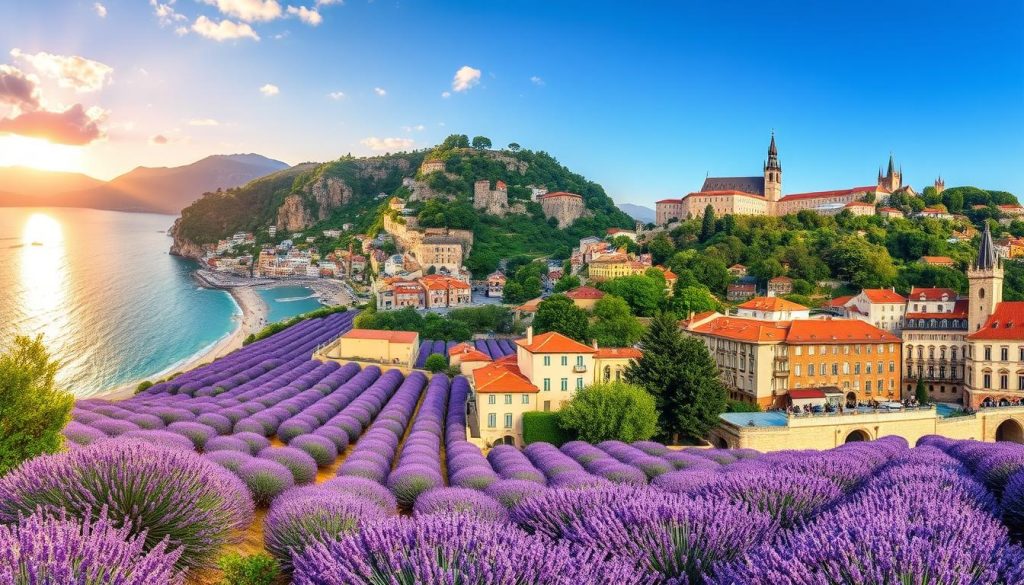
Portugal: The Sunshine Destination
Portugal is known for its beautiful beaches and warm climate. It has a good balance of cost and quality, with a CLI of 75.0 and QLI of 164.1. The Portugal Golden Visa makes it easy for retirees to stay long-term.
We love the friendly people, delicious food, and vibrant culture here.
Spain: Affordable Living by the Sea
Spain offers a relaxed lifestyle at a reasonable cost. Its CLI is 87.0, and the QLI is 176.5. The Spain non-lucrative visa helps retirees live here for a long time.
With its beautiful beaches, rich culture, and tasty tapas, Spain is a perfect blend of familiar and exotic.
Italy: Life Amongst the Ruins
Italy is famous for its ancient history and delicious food. The Italy golden visa attracts those who love history and modern comforts. Exploring ancient streets, enjoying cafés, and visiting the countryside is a dream come true.
Cost of Living in Popular Retirement Spots
We know that living costs vary across Europe. We aim to find places that are both comfortable and affordable. This helps us manage our retirement expenses without losing quality of life.
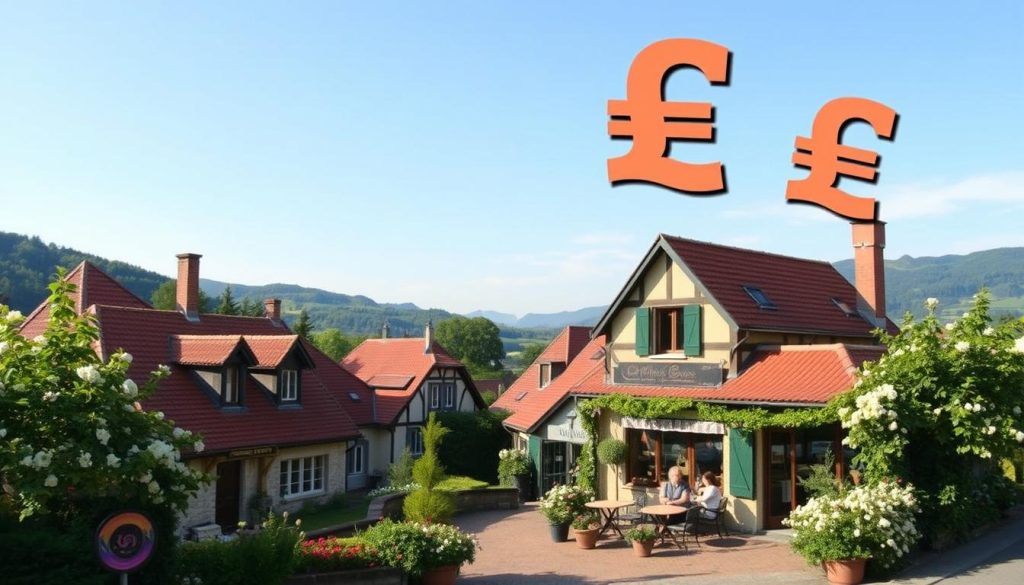
Comparing Costs Across Europe
Portugal, Spain, and Italy might be more affordable than you think. Living in smaller towns can save money on housing, food, and bills. But, medical care costs can vary, so it’s wise to check before moving.
Affordable Cities to Consider
Areas around Porto are great for retirees on a budget. In Spain, smaller coastal towns are cheaper than big tourist spots. Italy also has regions with lower housing costs, showing that affordable places exist if you look.
Hidden Expenses to Watch Out For
Be aware of visa fees, currency changes, and property taxes. Local fees and unexpected costs can pop up. Planning ahead helps avoid surprises and keeps your expenses in check.
Understanding Visa and Residency Requirements
Getting a retirement visa in Europe needs careful planning. We aim to make this easier by explaining the key steps. You’ll often need to show you have enough money, health insurance, and a place to invest.
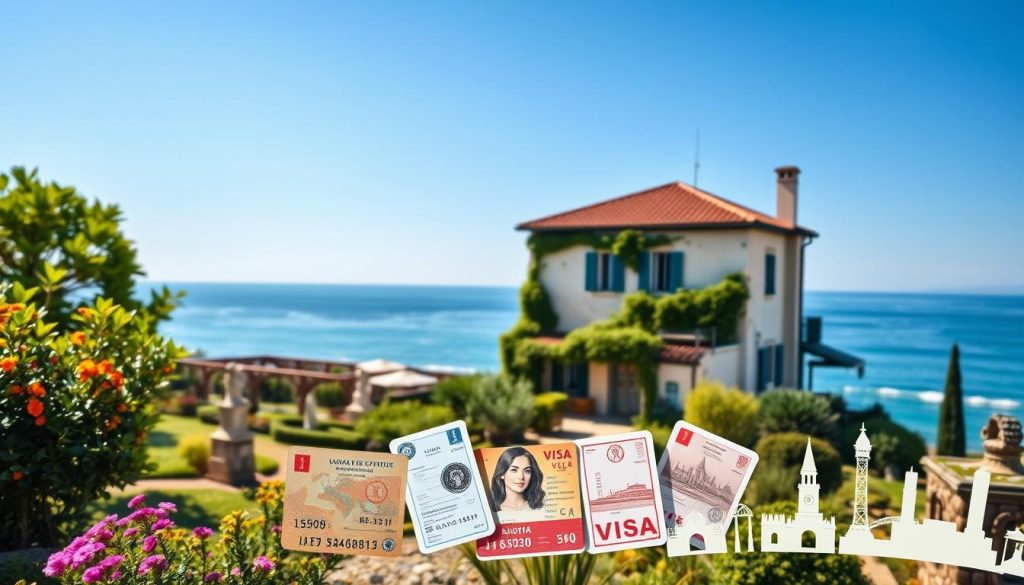
Getting the right documents can seem daunting. We want to guide retirees through the process. This way, they can enjoy their new life abroad with less stress.
Options for Retirees in Europe
Popular choices include Spain’s Non-Lucrative Visa, Portugal’s D7, and Italy’s Golden Visa. These options are for those who meet certain income and health standards. They cater to different needs, like lower costs, cultural experiences, or investment opportunities.
How to Navigate the Application Process
Start by preparing your financial documents and health insurance. Portugal’s D7 can take about 60 days. Italy requires at least €31,000 a year for one person. Spain focuses on your financial situation and health insurance.
Important Deadlines and Considerations
Keep an eye on the deadlines for your documents, like bank statements and property papers. Some visas allow a short entry period, with more steps needed later. Missing deadlines can mess up your travel plans and delay approval.
Lifestyle and Activities Available
Living in Europe offers a wide range of activities every day. Places like Bagnols-sur-Cèze in southern France are safe, with just 10 robberies in 2023. This lets us enjoy our morning market walks without worry.
The mild weather in coastal areas is perfect for outdoor fun. We can explore local beaches or scenic trails. It’s a great way to enjoy our leisure time.
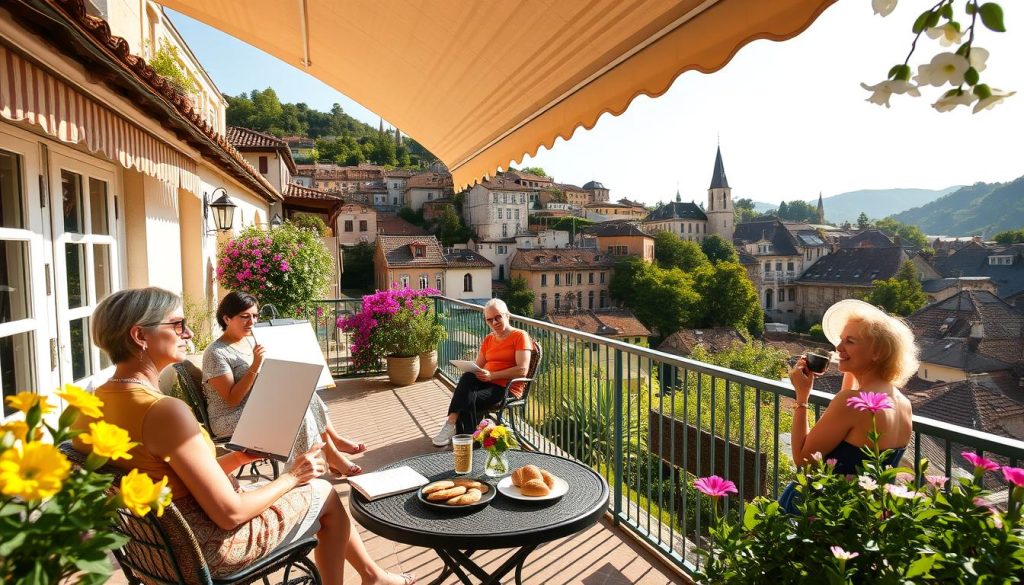
Outdoor Adventures and Nature Activities
There are golf courses and sailing clubs for those who love sports. Southern Europe’s mild winters mean we can enjoy the outdoors all year. Some towns even offer affordable rentals, so we can live near beautiful hiking spots and coastlines.
Cultural Experiences and Festivals
We dive into European festivals, filled with music, dance, and history. Places like Andalusia for flamenco and Florence for religious processions spark our passions. These events bring communities together and give us a real taste of local culture.
Local Cuisine and Dining Options
We enjoy Mediterranean dining with fresh seafood in Portugal or pasta in Italy. Weekly markets inspire us to try new dishes. Sharing meals with others becomes a big part of our social life, bringing people closer.
Best Cities for Retirees in Europe
Each European city has its own unique charm and way of life. Places like Kastoria in Greece and Braga in Portugal are perfect for those who love quiet. Moldova is great for those on a budget, with costs much lower than in the US.
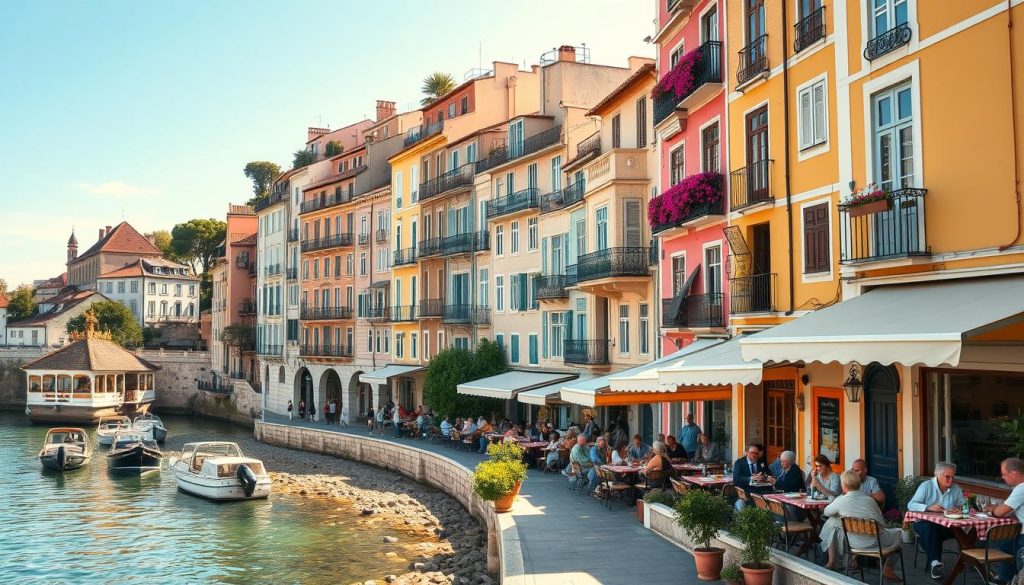
Three cities really stand out for their culture and friendly vibe. They offer great communities, healthcare, and affordable living.
Lisbon: A Vibrant Coastal City
Lisbon is a treasure for retirees. Its hills, cafes, and views are refreshing. Locals enjoy clubs, festivals, and seafood at family spots.
Barcelona: A Mosaic of Life
Barcelona is a mix of old and new. Exploring Las Ramblas and Gaudí’s works is exciting. It’s easy to meet others through language classes and events.
Florence: The Heart of Renaissance
Florence is all about art and history. It moves at a slow pace. Art fans love the museums, while locals gather in old piazzas.
Health and Wellness in Retirement
Health is key to a happy life, especially when moving to places like the UK, Portugal, or Switzerland. Embracing wellness abroad lets us access good care while exploring new places in our later years.
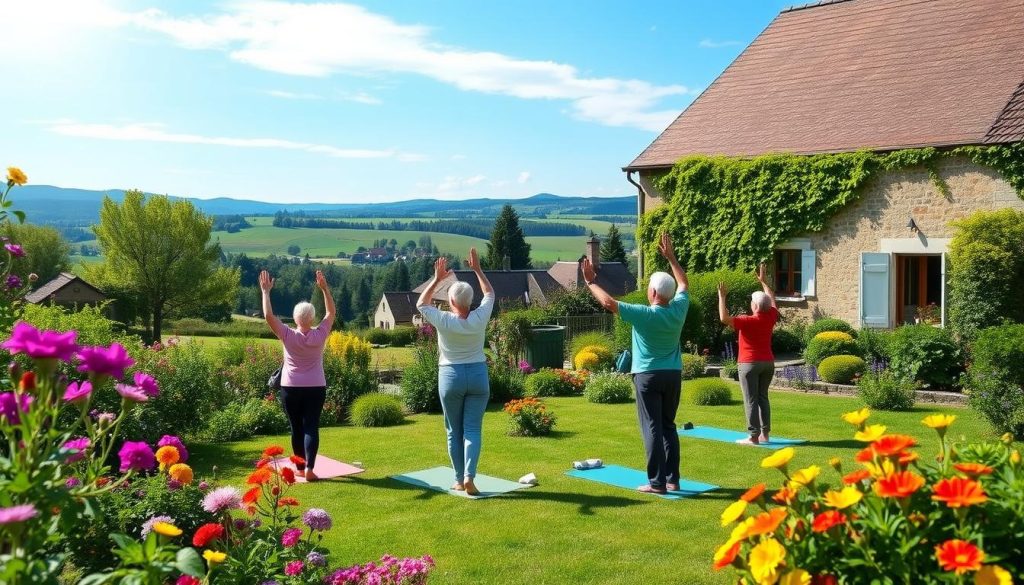
Healthcare Systems in Various Countries
We look into public schemes, like Britain’s National Health Service, for complex medical needs. Some choose private care for quicker service. As we age, having reliable healthcare providers is crucial for peace of mind.
Finding the Right Health Insurance
Our search for stability includes comparing health insurance policies. In Europe, coverage varies from national to extra add-ons. This way, we stay prepared for any health surprises.
Staying Active and Engaged
We stay active by trying local sports, walking in parks, or joining art classes. Simple activities like beach walks or group yoga boost our physical and mental health. This daily effort keeps us strong in body and mind.
Tips for a Smooth Transition
Retiring abroad can open up new interests and lower stress in our golden years. A slower pace and better climate encourage an active lifestyle. This helps us stay engaged and open-minded.

Exploring a different culture makes our daily lives richer. Forming meaningful connections and learning local customs are key. They help us feel at home.
Learning the Language
Learning the local language makes our journey smoother. Even basic phrases show respect and make simple tasks easier, like ordering food or getting directions.
Integrating into Local Communities
Joining clubs or volunteering helps us make new friends. This strengthens our connection to the community. It also deepens our appreciation for local traditions, making life more fulfilling.
Finding the Best Local Services
Seeking out trusted contacts who speak English or are recommended helps us. Reliable estate agents, financial advisors, and contractors make our lives easier. They give us peace of mind.
Final Thoughts on Retiring in Europe
We’ve looked at many sides of this journey, from historic sites to top-notch healthcare and friendly expat groups. The Annual Global Retirement Index highlights Portugal and France as great choices. This makes us excited for a fulfilling life abroad.
Preparing for Your New Adventure
Planning is key for a smooth retirement in Europe. We need to understand residency rules and finances well. By tackling paperwork and research, we feel ready to start our new life.
Embracing Change and New Experiences
Every time we learn about local ways and meet new people, we find new joys. The excitement of discovering new traditions gives us a sense of purpose. We learn from others who have thrived by being open and curious.
The Long-Term Benefits of European Living
Europe’s warm welcome and rich culture help us grow and feel well. Our days can be filled with fun, like visiting markets or going for evening walks. Living in a place steeped in history and connection makes every moment special.
